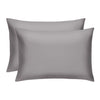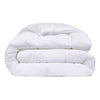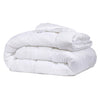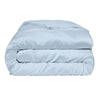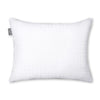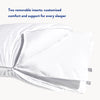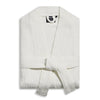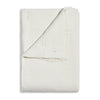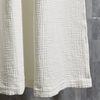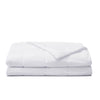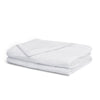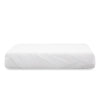The Daily Miracle
How Often Should You Wash Your Towels?
Published
September 02, 2020
Author
Nicholas Crusie

We wash ourselves everyday, but how often should we be washing our towels?
It defeats the purpose of taking a shower if we're going to be drying off with a less than clean towel. Just because our bodies are clean after a shower doesn't mean that our towel isn't getting dirty. The same goes for hand and face towels.
You're probably not washing your towels as often as you should be.
Think of the times when you reach for a towel to "just wipe off your fingers," or to dry up a spill, and not to mention any furry four legged friends you may have running around your house that accidentally rub up against a hanging towel.
How often do you wash your towels? It may be your dirty little secret, but not for long.
They're Dirtier Than They Look
Household towels may look clean, but most of the dirt that towels accumulate isn't visible to the human eye, making it an easy trap for less frequent washing.
Did you know that the top 18-23 layers of your skin are all made up of dead cells? Although some of this dead skin will wash off when we're in the shower or washing our hands, there will still be a whole lot of skin left over that will be easily wiped off by the towel that we use to dry off. And just like snakes, our skin is always shedding to allow new cells to come to the surface. Where do you think these dead cells are going? Other than on your floor, they're rubbing off into your towels. Furthermore, every inch of your skin has 650 sweat glands; that's a lot of opportunity for sweating!
Towels can also accumulate yeast, mold, and E. Coli, yikes!
Odors
Do any of your towels have any kind of odor to them? Mildew, perhaps?
The seemingly always damp state that towels tend to be in makes them a prime breeding ground for bacterial growth. And where there's bacteria, odor usually follows. Odor is one of the clearest signals to indicate that there are unwanted microbes growing on our towels.
If your towels have any type of odor whatsoever, they need a wash.
Mildew is the most likely odor for your towels to develop. Mildew is a form of fungus, closely related to mold, that thrives in moist and warm environments. Moist and warm sounds a lot like washrooms after a hot shower. Yup, bathroom towels are highly susceptible to developing a mildew odor. But remember the odor isn't even the worst part. The important part about recognizing a mildew smell is that it indicates there is bacteria growth somewhere nearby.
Does It Matter What Kind of Towel It Is?
Nope!
Whether it's a bath, face, or hand towel, they should all be washed at least once a week.
Bath towels
How often do you shower? How often do you workout or break a sweat?
These are questions you should ask yourself and use to assess just how dirty your towels are.
Face towels
The skin on our face is some of the most sensitive skin on our entire body.
The skin on our face is the first thing other people see when they look at us; a fresh, vibrant face is how we want to present ourselves to the world.
Most people wash their face once or twice a day. We always make sure our hands are clean before washing our faces, so why not ensure that the towel we use to dry them off is clean as well?
Hand towels
Hand towels in the kitchen are likely to be used to wipe off grease, food, and to dry the counter tops. If we're wiping our hands every now and again while we're cooking, preparing a meal, or just lounging in the kitchen with a drink and snacks, we definitely want these towels to be as clean as possible - it's just sanitary!
Bath, face, and hand towels all play an important role in keeping us clean during our day to day lives. It's important to wash them frequently to ensure they're staying fresh, soft, and bacteria-free.
Your Skin Will Be Healthier
Doctor Charles Gerba, a microbiologist at the University of Arizona, says that after about two days, if you dry your face on a hand towel, you're probably getting more E. coli on your face than if you stuck your head in a toilet and flushed it.
That's almost too gross to believe. But believe it we will - and wash our towels more often we will too! Dr. Gerba also found in his research that 1 in 4 household towels are contaminated with E coli. The presence of E. coli is inversely correlated with the frequency of washing of the towels: less washing = more E. coli.
The more often you wash your towels, the less build up of bacteria they will have. Some towels are made of special materials, like high quality cotton and natural silver that can help them stay clean on their own. The cleaner your towels are, the healthier your skin will be. If your skin is acne-prone or sensitive, investing in a good set of towels can be well worth your while.
Keep Your Towels as Clean as Possible
We've already told you that you should be washing your towels at least once a week. We hope you take this advice (your skin probably shares this hope with us too), but however often you do get around to washing them, there are things you can be doing to make sure they're getting as clean as possible.
Make sure the towel is actually getting dry after each use
- Hang up your towel to dry after each use.
- Try to avoid letting a bath towel sit in a clump on the floor. The towel's warmth and wetness make it easy for bacteria to develop, which we definitely do not want.
Wash towels in hot water
- Higher water temperature will have a better shot at killing any germs that may be on your towels.
- The World Health Organization tells us that a temperature of 140-150 degrees Fahrenheit is required to kill off any bacteria or viruses.
- Most washing machines' "Hot" setting is around 130-150 degrees Fahrenheit, so unless you're then going to dry the towels with hot air in the dryer, try to use the hottest setting possible on your washer.
Follow care instructions
- Follow your towel's specific instructions for washing, i.e. preferred detergent and wash cycle if applicable. This will mean your towel is being washed in the way that's most effective for its composition.
Try adding baking soda
- Adding ½ cup of baking soda to a laundry load can help boost detergents' efficiency and kill bacteria.
- Adding baking soda also boosts your laundry load by aiding in the removal of odors and softening fabrics - yay baking soda!
Don't overload the washer or dryer
- Don't fill up the washer or dryer to the very top.
- While it might be tempting to completely fill a load, if the machine is too full it means that its contents won't have enough room to move around and get rinsed or aired out properly. This may result in there being residue on your towels that will make them crusty.
Wash new towels before using them for the first time
- New towels usually come coated in a fabric softener so that they're more attractive for shoppers in stores.
- Always give new towels their own run through the wash before using them in order to take off this coating. Giving them an initial wash will also help loosen the fibers and help the towel reach its maximum absorbency potential.
- You can also add 1 cup of vinegar into this initial wash to help set the towel's colors.
The Takeaway
Wash your towels at least once a week.
More often if possible, but at least once a week.
There are towels out there that are made up of special materials that help clean themselves, meaning you can wash them 3x less frequently. But as a general rule of thumb? At least once a week.
 |
Did you know?Adding baking soda boosts your laundry load by aiding in the removal of odors and softening fabrics - yay baking soda! |
Sources:
- https://www.aad.org/public/parents-kids/healthy-habits/parents/kids/how-skin-grows
- https://www.aarp.org/health/healthy-living/info-2017/when-to-wash-towels-remove-bacteria-fd.html
- https://learning-center.homesciencetools.com/article/skin-touch/
- https://arizona.pure.elsevier.com/en/publications/bacterial-occurrence-in-kitchen-hand-towels
- https://www.insider.com/what-temperature-kills-germs
- https://www.bhg.com/homekeeping/laundry-linens/linens/washing-and-caring-for-towels/


